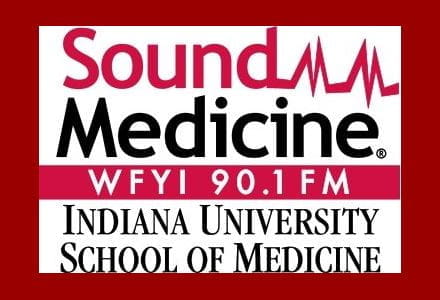INDIANAPOLIS — The “Sound Medicine” program for April 6 includes segments about a new test that indicates whether pancreatic cysts are benign, a minimally invasive treatment for basal cell carcinoma, and spelling out the ABCs of breast cancer.
Can benign pancreatic cysts be detected with a test? A recent study published in the Journal of the American College of Surgeons reported that researchers have developed a test that identifies benign pancreatic cysts. The test checks for the biomarker vascular endothelial growth factor A, or VEGF-A. High levels of VEGF-A indicate that a cyst is unlikely to become malignant and could potentially save patients from years of tests and surgery. C. Max Schmidt, M.D., Ph.D., MBA, senior author of the study, discusses the effectiveness of the test, the study, and how this finding will help doctors focus their tests and treatments. Dr. Schmidt is professor of surgery at the IU School of Medicine.
Is there a safe alternative to Mohs surgery for skin cancer? Mohs surgery, also known as micrographic surgery, has been the most effective treatment for basal cell carcinoma since its development in 1938. However, Ray Jalian, M.D., a clinical fellow in dermatology at Massachusetts General Hospital, recently led a study that showed lasers to be a promising alternative therapy to remove based cell carcinoma. Dr. Jalian joins “Sound Medicine” to comment on the new procedure, the pros and cons of the Mohs procedure, and what the future looks like for treating basal cell carcinoma with lasers.
What are the ABCs of breast cancer? Madhulika Sikka, executive editor of NPR news, recently published “A Breast Cancer Alphabet.” Sikka is a breast cancer survivor who chronicles her journey with cancer in the book as well as giving A-to-Z advice to those with breast cancer. Sikka talks with host Barbara Lewis about her time with cancer, why she decided to write a book, and how she formulated her A-to-Z advice for breast cancer patients.
Medical ethics in the news: Eric Meslin, Ph.D., discusses three ethical controversies in the news. Dr. Meslin will be commenting on the steps the United Nations is taking to eradicate polio in Pakistan, the compassionate use of experimental medicines in young patients, and the genetic disorder trisomy 21, which causes Down syndrome. Dr. Meslin is the director of the Center for Bioethics at Indiana University.
“Sound Medicine” covers controversial ethics topics, breakthrough research studies and the day-to-day application of recent advancements in medicine. It’s also available via podcast and Stitcher Radio for mobile phones and iPads and posts updates on Facebook and Twitter.
Co-produced by the IU School of Medicine and WFYI Public Radio (90.1 FM) and underwritten in part by Indiana University-Purdue University Indianapolis, “Sound Medicine” airs on the following Indiana public radio stations: WBSB (Anderson, 89.5 FM), WFIU (Bloomington, 103.7 FM; Columbus, 100.7 FM; Kokomo, 106.1 FM; Terre Haute, 95.1 FM), WNDY (Crawfordsville, 91.3 FM), WVPE (Elkhart/South Bend, 88.1 FM), WNIN (Evansville, 88.3 FM), WBOI (Fort Wayne, 89.1 FM), WFCI (Franklin, 89.5 FM), WBSH (Hagerstown/New Castle, 91.1 FM), WFYI (Indianapolis), WBSW (Marion, 90.9 FM), WBST (Muncie, 92.1 FM), WBSJ (Portland, 91.7 FM), WLPR (Lake County, 89.1 FM) and WBAA (West Lafayette, 101.3 FM).
“Sound Medicine” is also broadcast on these public radio stations across the country: KSKA (Anchorage, Alaska), KTNA (Talkeetna, Alaska), KUHB (Pribilof Islands, Alaska), KUAF (Fayetteville and Fort Smith, Ark.), KIDE (Hoopa Valley, Calif.), KRCC (Colorado Springs, Colo.), KEDM (Monroe, La.), WCMU (Mount Pleasant, Mich.), WCNY and WRVO-1 (Syracuse, N.Y.), KMHA (Four Bears, N.D.), WYSU (Youngstown, Ohio), KPOV (Bend, Ore.) and KEOS (College Station, Texas).
Please check local listings for broadcast dates and times.




